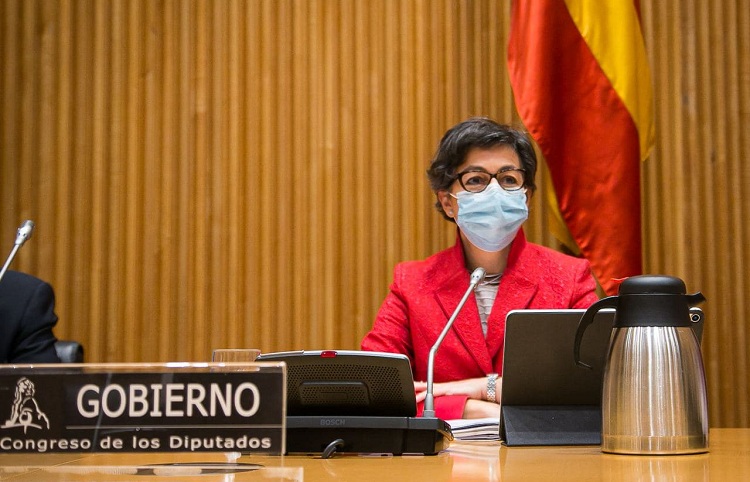The Diplomat
The Minister of Foreign Affairs, Arancha González Laya, defended yesterday in Parliament the recent pre-agreement with the United Kingdom on Gibraltar, an agreement which, she said, will allow Spain “to take the initiative for the first time in 300 years” and which does not imply the renunciation of the “inalienable historical claim” to sovereignty, nor, “therefore, to co-sovereignty”.
The pre-agreement is “a plan for the 21st century” and “a step from words to deeds”, which will strengthen “national interests in the practical field” and represents a “turning point in our relationship with the United Kingdom with regard to Gibraltar”, the minister said during her appearance, at her own request, before the Joint Congress-Senate Committee for the EU to explain the agreement of 31 December.
The Spanish-British pact, whose ratification by the institutions is estimated to take place within six months, will allow Spain to have “the last word” on the application of the Schengen Treaty, both in terms of the passage of persons and the passage of goods, the minister explained. Depending on the agreement, the physical border will disappear from the fence and its functions will be moved to the port and airport, while controls on access of people to Gibraltar and the Schengen Area will fall to the Gibraltar and Spanish authorities, respectively. However, although Spain will be responsible for the implementation of Schengen, it will do so through the assistance of Frontex during the first four years, after which the agreement will only be ratified if both parties so wish.
In any case, it has yet to be determined which security forces will be responsible for surveillance at the port and airport, something that will become known over the next six months, according to the Government Delegate in Andalusia, Sandra García. In this regard, the chief minister of Gibraltar, Fabian Picardo, has repeatedly warned that Spain will not exercise “any kind of control” at the port or airport, because “only Gibraltar decides who enters Gibraltar”, and this Tuesday assured that his government will not allow, under any circumstances, Spanish security forces to take over from Frontex when the four-year period ends.
Consequences of a non-agreement
During her speech to the Joint Committee, González Laya said that if Spain had not reached an agreement with London, Gibraltar would not only have had “the only hard Brexit in the whole of the European Union”, but that the fence “would have become more rigid and tougher, as has happened in the past”. Furthermore, the United Kingdom would have consolidated the “colonial” nature of the Rock and, accordingly, the separation of British territory and its citizens from the rest of Spain, and for Spain it would have represented an economic cost of some eight billion, particularly in sectors such as the automobile, agrifood and chemical industries. The economy of the Spanish area of Campo de Gibraltar would also have been “seriously damaged”, according to González Laya, given that 15% of the region’s GDP “depends on and breathes from Gibraltar, whether we like it or not”.
The minister also said that, if the agreement had not been reached, “Spain would have lost its capacity to influence and control this territory for at least a generation”, while thanks to the pre-agreement, “for the first time in 300 years, Spain has regained a leading role in Gibraltar’s affairs and is taking the initiative with a clear future plan for the Campo de Gibraltar and the Straits area” and with the possibility of creating an area of “shared prosperity”. “If another 300 years of maintaining claims and being ignored is what is intended, a failure to reach an agreement would certainly have contributed greatly to this result”, she said.
On the subject of sovereignty, the minister said that the government’s objective is that, in the future, “Gibraltar will not be an issue that pits Spain and the United Kingdom against each other, to the extent that we have managed to put sovereignty issues on hold until circumstances allow us to address them to the benefit of all”. Sovereignty is an “inalienable historical claim” and “we have not given up on sovereignty and therefore we have not given up on co-sovereignty, but we cannot stay there another 300 years”, she said. That is why, she added, it is necessary to focus on the search for “concrete benefits” for citizens, and that is why the success of this agreement will allow Spaniards and Gibraltarians “to discover many elements that unite us and to explore new channels for addressing the many common interests that we share, from respect for how each one sees himself”.
In his reply, the Senator and spokesman for the Popular Group on the Joint Committee, Rubén Moreno Palanques, said that “the Brexit agreement can be summed up as Spain losing Gibraltar again” and renouncing “co-sovereignty”. “For the moment, that Spain will have effective control over entry into Gibraltar has already been denied by Picardo, whom you have praised”, he continued. “One or the other is not telling the truth”, he added.
For his part, the spokesperson for Vox, Iván Espinosa de los Monteros, said that the pre-agreement represents “an unprecedented transfer of sovereignty” in 300 years and contributes to “giving continuity to a tax haven”, while the spokesperson for Ciudadanos, Marta Martín Llaguno, accused the minister of “selling the skin of the wolf before hunting it, with a hype that does not correspond to reality”.







